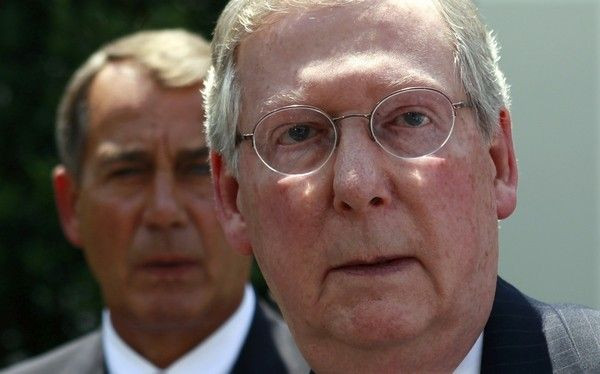Coronavirus USA Update: Democrats Vote 'No' To COVID-19 Funding To Fight Virus
KEY POINTS
- Despite signs of failure, Republicans will force another vote on their stimulus package Monday morning
- Senate Democrats shut down the stimulus bill as pro-rich
- "We're going to vote at 9:45 in the morning, 15 minutes after the markets open," Sen. McConnell said
Republican senators last week crafted the Senate's version of the House's $1 trillion coronavirus economic stimulus package but was quickly shutdown by Democrats Sunday.
Senate Democrats were aghast at the pro-business, anti-middle class proposal drawn-up by the GOP when these came to light, and on Sunday blocked action on the bill, placing the federal government's $2 trillion COVID-19 relief package in jeopardy. Democrats unanimously objected to the GOP proposal, which they contend fails to adequately protect workers and doesn't impose strict enough restrictions on bailed-out businesses.
All 47 Senate Democrats voted against the bill in a procedural vote while 47 Republicans voted for it. The final vote of 47-47 was well short of the 60 votes needed to advance the bill. Financial analysts said the deadlock most certainly means another massive Wall Street selloff Monday. Stock futures cratered 5% at the news.
In a desperate bid to prevent Wall Street from opening the week with a massive loss, Senate majority leader Sen. Mitch McConnell, R-KY, announced another vote on the rejected GOP bill shortly after markets open.
"Here's the way ahead, colleagues," he said. "We're going to vote at 9:45 in the morning, the same vote we had at 6 p.m. tonight. We're going to vote at 9:45 in the morning, 15 minutes after the markets open, and see whether there's a change of heart."
Republicans had hoped to come to a deal with Democrats by Monday but were instead greeted by intense Democratic opposition. The draft Republican bill contains $500 billion in loans and other support for distressed cities, states and industries. It provides a bailout of up to $50 billion for passenger airlines and $8 billion for cargo carriers.
The bill also allows the federal government to take stock shares or other equity in any business that accepts loans under the program. It will also provide $1,200 direct payments to millions of Americans, add more jobless benefits and aid to states, and provide hundreds of billions of dollars for loans to businesses.

The bill was still slammed as pro-business by Democrats. They denounced the GOP spending bill as a corporate giveaway that favored big business over employees, and fails to ensure bailed-out companies won't enrich themselves. Democrats were especially miffed at the inclusion of a provision to give the Federal Reserve access to $425 billion -- which some called a corporate slush fund -- to be lent to flailing companies by the Trump administration without restrictions on which businesses could receive it or how it could be used, the New York Times reported.
The bill also grants considerable authority to the Department of the Treasury and to secretary Steve Mnuchin to implement the slush fund. Some Democrats believe the bill gives Treasury the power to waive the ban on share buybacks. Others point out protections for workers and aid for hospitals isn’t included in the GOP bill.
Democrats said the bill gives far far too much discretion to Mnuchin and his lieutenants to decide which companies will be bailed out. The bill will also allow too much time before Mnuchin has to disclose the recipients. The bill gives Mnuchin up to six months to keep the identities of these companies secret.
“In the midst of an unprecedented national crisis, Republicans can’t seriously expect us to tell people in our communities who are suffering that we shortchanged hospitals, students, workers and small businesses, but gave big corporations hundreds of billions of dollars in a secretive slush fund,” said Sen. Patty Murray, D-WA, a top negotiator on the package.
Democrats also complained the bill won't require recipients not to fire their employees. They also said it provides insufficient unemployment aid (only three months compared to the four they wanted) and lacked adequate funding for state and local governments, emergency food assistance and relief from student loans.
Democrats claim the GOP reneged on an agreement putting $250 billion into unemployment insurance. They also accused them of adding the corporate slush fund and removing their priorities like expanded paid sick leave.
© Copyright IBTimes 2024. All rights reserved.





















